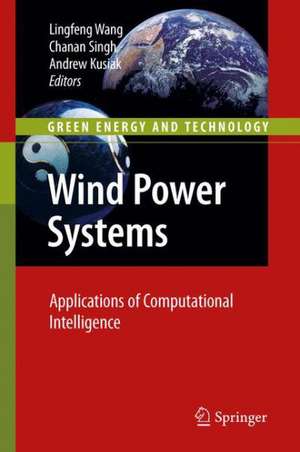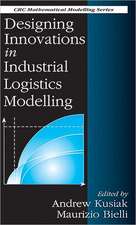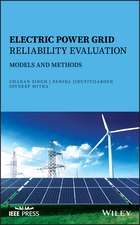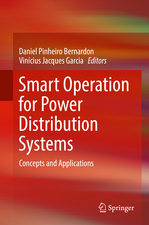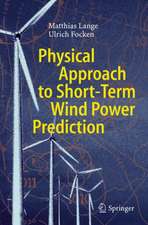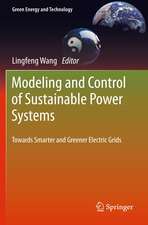Wind Power Systems: Applications of Computational Intelligence: Green Energy and Technology
Editat de Lingfeng Wang, Chanan Singh, Andrew Kusiaken Limba Engleză Paperback – 5 sep 2012
Researchers have been developing biologically-inspired algorithms in a wide variety of complex large-scale engineering domains. Distinguished from the traditional analytical methods,the new methods usually accomplish the task through their computationally efficient mechanisms. Computational intelligence methods such as evolutionary computation, neural networks, and fuzzy systems have attracted much attention in electric power systems. Meanwhile, modern electric power systems are becoming more and more complex in order to meet the growing electricity market. In particular, the grid complexity is continuously enhanced by the integration of intermittent wind power as well as the current restructuring efforts in electricity industry. Quite often, the traditional analytical methods become less efficient or even unable to handle this increased complexity. As a result, it is natural to apply computational intelligence as a powerful tool to deal with various important and pressing problems in the current wind power systems. This book presents the state-of-the-art development in the field of computational intelligence applied to wind power systems by reviewing the most up-to-date work and representative practical problems collecting contributions from leading experts in electrical engineering, system engineering, and other disciplines.
| Toate formatele și edițiile | Preț | Express |
|---|---|---|
| Paperback (1) | 951.77 lei 6-8 săpt. | |
| Springer Berlin, Heidelberg – 5 sep 2012 | 951.77 lei 6-8 săpt. | |
| Hardback (1) | 956.33 lei 6-8 săpt. | |
| Springer Berlin, Heidelberg – 9 iun 2010 | 956.33 lei 6-8 săpt. |
Din seria Green Energy and Technology
- 18%
 Preț: 943.43 lei
Preț: 943.43 lei - 20%
 Preț: 629.52 lei
Preț: 629.52 lei - 18%
 Preț: 1124.92 lei
Preț: 1124.92 lei - 18%
 Preț: 947.35 lei
Preț: 947.35 lei - 15%
 Preț: 655.92 lei
Preț: 655.92 lei - 18%
 Preț: 957.62 lei
Preț: 957.62 lei - 18%
 Preț: 789.52 lei
Preț: 789.52 lei - 17%
 Preț: 464.56 lei
Preț: 464.56 lei - 15%
 Preț: 645.79 lei
Preț: 645.79 lei - 18%
 Preț: 903.93 lei
Preț: 903.93 lei - 24%
 Preț: 1322.09 lei
Preț: 1322.09 lei - 18%
 Preț: 890.54 lei
Preț: 890.54 lei - 18%
 Preț: 1115.46 lei
Preț: 1115.46 lei - 18%
 Preț: 1117.03 lei
Preț: 1117.03 lei - 18%
 Preț: 949.73 lei
Preț: 949.73 lei - 18%
 Preț: 892.11 lei
Preț: 892.11 lei - 15%
 Preț: 648.24 lei
Preț: 648.24 lei - 18%
 Preț: 997.09 lei
Preț: 997.09 lei - 15%
 Preț: 579.81 lei
Preț: 579.81 lei - 18%
 Preț: 1123.15 lei
Preț: 1123.15 lei - 18%
 Preț: 961.41 lei
Preț: 961.41 lei - 17%
 Preț: 490.23 lei
Preț: 490.23 lei - 18%
 Preț: 904.60 lei
Preț: 904.60 lei - 15%
 Preț: 643.34 lei
Preț: 643.34 lei -
 Preț: 287.91 lei
Preț: 287.91 lei - 24%
 Preț: 634.05 lei
Preț: 634.05 lei -
 Preț: 379.40 lei
Preț: 379.40 lei - 18%
 Preț: 783.20 lei
Preț: 783.20 lei - 18%
 Preț: 1394.84 lei
Preț: 1394.84 lei - 18%
 Preț: 1691.57 lei
Preț: 1691.57 lei - 18%
 Preț: 1112.48 lei
Preț: 1112.48 lei - 15%
 Preț: 592.61 lei
Preț: 592.61 lei - 18%
 Preț: 952.09 lei
Preț: 952.09 lei - 18%
 Preț: 944.19 lei
Preț: 944.19 lei - 18%
 Preț: 891.33 lei
Preț: 891.33 lei - 18%
 Preț: 1252.44 lei
Preț: 1252.44 lei - 18%
 Preț: 789.52 lei
Preț: 789.52 lei - 20%
 Preț: 566.30 lei
Preț: 566.30 lei - 18%
 Preț: 1113.71 lei
Preț: 1113.71 lei - 18%
 Preț: 1114.24 lei
Preț: 1114.24 lei - 24%
 Preț: 590.60 lei
Preț: 590.60 lei - 20%
 Preț: 567.50 lei
Preț: 567.50 lei - 24%
 Preț: 907.50 lei
Preț: 907.50 lei - 18%
 Preț: 952.89 lei
Preț: 952.89 lei - 18%
 Preț: 952.89 lei
Preț: 952.89 lei - 18%
 Preț: 950.52 lei
Preț: 950.52 lei
Preț: 951.77 lei
Preț vechi: 1160.70 lei
-18% Nou
Puncte Express: 1428
Preț estimativ în valută:
182.15€ • 189.46$ • 150.37£
182.15€ • 189.46$ • 150.37£
Carte tipărită la comandă
Livrare economică 14-28 aprilie
Preluare comenzi: 021 569.72.76
Specificații
ISBN-13: 9783642263637
ISBN-10: 3642263631
Pagini: 452
Ilustrații: X, 440 p.
Dimensiuni: 155 x 235 x 24 mm
Greutate: 0.63 kg
Ediția:2010
Editura: Springer Berlin, Heidelberg
Colecția Springer
Seria Green Energy and Technology
Locul publicării:Berlin, Heidelberg, Germany
ISBN-10: 3642263631
Pagini: 452
Ilustrații: X, 440 p.
Dimensiuni: 155 x 235 x 24 mm
Greutate: 0.63 kg
Ediția:2010
Editura: Springer Berlin, Heidelberg
Colecția Springer
Seria Green Energy and Technology
Locul publicării:Berlin, Heidelberg, Germany
Public țintă
ResearchCuprins
Optimal Allocation of Power-Electronic Interfaced Wind Turbines Using a Genetic Algorithm – Monte Carlo Hybrid Optimization Method.- Optimal Conductor Size Selection in Distribution Systems with Wind Power Generation.- Global Optimization of Wind Farms Using Evolutive Algorithms.- Capacity Benefit Margin Evaluation in Multi-area Power Systems Including Wind Power Generation Using Particle Swarm Optimization.- Stochastic Dispatch of Power Grids with High Penetration of Wind Power Using Pareto Optimization.- Wind Turbine Diagnostics Based on Power Curve Using Particle Swarm Optimization.- Optimal Controller Design of a Wind Turbine with Doubly Fed Induction Generator for Small Signal Stability Enhancement.- Eigenvalue Analysis of a DFIG Based Wind Power System under Different Modes of Operations.- An ANN-Based Power System Emergency Control Scheme in the Presence of High Wind Power Penetration.- Intelligent Control of Power Electronic Systems for Wind Turbines.- Intelligent Controller Design for a Remote Wind-Diesel Power System: Design and Dynamic Performance Analysis.- Adaptive Fuzzy Control for Variable Speed Wind Systems with Synchronous Generator and Full Scale Converter.- Application of TS-Fuzzy Controller for Active Power and DC Capacitor Voltage Control in DFIG-Based Wind Energy Conversion Systems.- Fuzzy Logic as a Method to Optimize Wind Systems Interconnected with the Grid.- Intelligent Power System Frequency Regulations Concerning the Integration of Wind Power Units.
Textul de pe ultima copertă
Renewable energy sources such as wind power have attracted much attention because they are environmentally friendly, do not produce carbon dioxide and other emitants, and can enhance a nation’s energy security. For example, recently more significant amounts of wind power are being integrated into conventional power grids. Therefore, it is necessary to address various important and challenging issues related to wind power systems, which are significantly different from the traditional generation systems. This book is a resource for engineers, practitioners, and decision-makers interested in studying or using the power of computational intelligence based algorithms in handling various important problems in wind power systems at the levels of power generation, transmission, and distribution.
Researchers have been developing biologically-inspired algorithms in a wide variety of complex large-scale engineering domains. Distinguished from the traditional analytical methods,the new methods usually accomplish the task through their computationally efficient mechanisms. Computational intelligence methods such as evolutionary computation, neural networks, and fuzzy systems have attracted much attention in electric power systems. Meanwhile, modern electric power systems are becoming more and more complex in order to meet the growing electricity market. In particular, the grid complexity is continuously enhanced by the integration of intermittent wind power as well as the current restructuring efforts in electricity industry. Quite often, the traditional analytical methods become less efficient or even unable to handle this increased complexity. As a result, it is natural to apply computational intelligence as a powerful tool to deal with various important and pressing problems in the current wind power systems. This book presents the state-of-the-art development in the field of computational intelligence applied to wind power systems by reviewing the most up-to-date work and representative practical problems collecting contributions from leading experts in electrical engineering, system engineering, and other disciplines.
Researchers have been developing biologically-inspired algorithms in a wide variety of complex large-scale engineering domains. Distinguished from the traditional analytical methods,the new methods usually accomplish the task through their computationally efficient mechanisms. Computational intelligence methods such as evolutionary computation, neural networks, and fuzzy systems have attracted much attention in electric power systems. Meanwhile, modern electric power systems are becoming more and more complex in order to meet the growing electricity market. In particular, the grid complexity is continuously enhanced by the integration of intermittent wind power as well as the current restructuring efforts in electricity industry. Quite often, the traditional analytical methods become less efficient or even unable to handle this increased complexity. As a result, it is natural to apply computational intelligence as a powerful tool to deal with various important and pressing problems in the current wind power systems. This book presents the state-of-the-art development in the field of computational intelligence applied to wind power systems by reviewing the most up-to-date work and representative practical problems collecting contributions from leading experts in electrical engineering, system engineering, and other disciplines.
Caracteristici
Contains the latest research in the area of wind power systems with computational intelligence applied Written by experts in the field Up-to-date resource discussing many typical applications of computational intelligence in wind power systems
